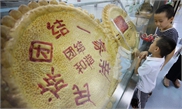
A girl dressed in ethnic costumes dances at a night fair in Kashgar, Northwest China's Xinjiang Uyghur Autonomous Region, August 12, 2019. Photo:Xinhua
China's state broadcaster CGTN aired an English documentary, Fighting Terrorism in Xinjiang, earlier December, showing violent terrorism and religious extremism in China's Xinjiang Uyghur Autonomous Region, including Urumqi riots on July 5, 2009, the Tiananmen Square terror attack on October 28, 2013 and the Kunming train station assault on March 1, 2014. The documentary bares the destructive face of extremism amid indefensible Western accusation over Xinjiang.The video footage of terrorist attacks seeks to show global audience the severe threats of terrorism, separatism and religious extremism Xinjiang and the country are facing, with shocking images and convincing statistics.
However, it is surprising that Western media outlets, which have gone to town with the so-called human rights issue in Xinjiang, have not paid much attention to the documentary. It reminds me of An Inconvenient Truth, a 2006 US concert documentary film that won an Oscar. The film is about former US vice president Al Gore's campaign to educate people about global warming. Gore accused Western mainstream media of paying little attention and feeble coverage of the "inconvenient truth," including environmental deterioration due to global warming, under the pressure of significant financial groups and enterprises.
The situation in Xinjiang is also a kind of "inconvenient truth" from the perspective of Western media outlets. They have deliberately ignored the fact that people of all ethnic groups in Xinjiang are enjoying a stable life, and there are no violent incidents in recent years. Instead, Western media have been hyping up the so-called classified documents and the so-called victims in the region.
Scholars of communication and journalism say the objectivity of a media outlet can be assessed by what it covers and what it doesn't. In the context of the Xinjiang issue, apart from their biased reports, Western media outlets also selectively ignore facts, especially when Chinese media outlets release convincing figures, data and images.
It is noteworthy that not only Western mainstream media, new media platforms in the West, which have repeatedly advocated openness, equality and neutrality, have also interfered with the promulgation of this "inconvenient truth."
CGTN has uploaded the complete documentary on YouTube, but there were only over 46,800 views by Thursday, far less than the 1.04 million - the number of CGTN subscribers on YouTube. Some netizens noted that YouTube may have controlled the streaming, or that they haven't received the notification about the video on YouTube.
The recent academic studies also reveal that selective deafness has already become a conventional strategy for media. A research by the Oxford Internet Institute, released in 2018, made an analysis of "1.5 million comments on official political information posts on Weibo and 1.1 million posts using hashtags associated with China and Chinese politics on Twitter," and found out that "no evidence was found of pro-Chinese-state automation on Twitter. Automation on Twitter was associated with anti-Chinese-state perspectives." The authors claimed this is "presumably aimed at diasporic Chinese and mainland users who 'jump the wall' to access blocked platforms," adding "these users come to Twitter seeking more diverse information and an online public sphere but instead they find an information environment in which a small number of anti-Chinese-state voices are attempting to use automation to dominate discourse."
The same is true of traditional mainstream Western media. Much empirical research has indicated that the US stance on China decides the trend of global public opinion. Hence, it is natural that nobody knows the "inconvenient truth" that US media has no intention to report.
Under the situation that China does not have much say in world opinion, how should the country cope with the selective deafness?
The content posted by China's official media is always the victim of Western media outlets' selective deafness. Even though there might be a long tail effect of CGTN's documentary since its channel has over a million followers, the broadcaster should still be more flexible on its publicity strategy. For example, CGTN's logo can be obscured and the documentary can be shown on a third party platform. The documentary can also be cut to several short video clips and be published on multiple platforms.
Besides, Chinese media should take the initiative to post reliable information about hot-spot issues, such as the education and vocational training center in Xinjiang. More detailed planning can be made to increase the effectiveness of news diffusion. As long as Xinjiang develops toward prosperity, and Chinese media's publicity strategy improves, the truth will come to the light eventually. More people will recognize Western media's selective deafness strategy and break away from its lie of objectivity and freedom of the press.
The author is a professor at School of Journalism and Communication, Tsinghua University. opinion@globaltimes.com.cn



